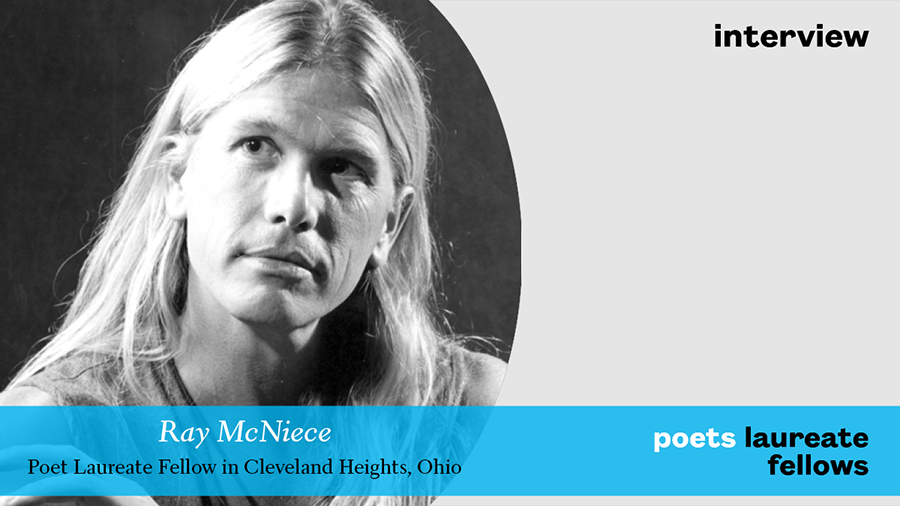
Ray McNiece is the author of several books, including Breath Burns Away (Red Giant Press, 2019) and Love Song for Cleveland (Red Giant Books, 2015). McNiece is writer-in-residence at Ruffing Montessori School and a member of Young Audiences National Arts in Education Teaching Cohort. He works for both the Ohio Arts Council Arts in Education Residency Artist program and the Center for Arts Inspired Learning of Northeast Ohio. He is currently poet laureate of Cleveland Heights through 2023. In 2022, McNiece received an Academy of American Poets Laureate Fellowship. In collaboration with Heights Arts, McNiece will organize the “Poem for Cleveland Project” and create a mosaic of Cleveland voices through intergenerational and multicultural poetry workshops. These will be monthly community-based workshops established with the help of partner organizations that pair youth poets with elders to tell the story of Cleveland.
Poets.org: What do you hope for the future of poetry in Cleveland, and what support do you hope future poets laureate in Ohio have?
Ray McNiece: d.a. levy said, “I have a city to cover with lines,” and I think this project is helping us describe our shared experience of place. We collectively are poised to make poetry really pop and, at the same time, take it deeper, to an even more intimate part of our lives. Heights Arts is the oldest laureateship in the state. In recent years, many more laureateships have been initiated. Through the Ohio Center for the Book podcast, we are using the Poem for Cleveland Project as a template for other communities to write a poem about where they come from. Funding laureateships is one way to bring a focus and a focal point wherein to start that process of making poetry an accessible component of a creative community.
Poets.org: How has being a poet laureate changed your relationship to your own writing?
RM: I was already a public poet, in that I see the larger role of poetry for a community. I am more cognizant of the importance of that role than I was before, and the need to continue broadening the circle of poetry to include “citizen poets.” Each voice within the community has value, regardless of age or academic credentials.
Poets.org: How can a poet, or poetry, bring a community together?
RM: Poets are the means by which a place comes to know itself, giving voice to shared experiences. We begin to hear how we are more alike than unalike, no matter our age or ethnicity, faith, or sexual orientation. Poetry is an empathic art; so helping us feel more attuned to each other can be the spiritual energy that creates a healthy, healing community.
Poets.org: What part of your project were you most excited about?
RM: I am most excited about the dialogue we are creating in the intergenerational, multicultural workshops. The “then and now” perspective we share about our common ground and common dreams. It helps us know where we are from in order to know where we can go together.
Poets.org: What obstacles, if any, did you experience when starting your project?
RM: Most of the obstacles have been logistical. For instance, not all the youth poets are vaccinated and boosted, which are requirements for some of the elder centers we are visiting. Also, attendance at the library sites, our primary workshop spaces, can vary widely. We have had as many as twenty-five participants at one branch and maybe only two at another. That is something I did not anticipate, but part of our mission was to reach out to underserved communities, so we shall persevere.
Poets.org: From your experience, how can writing and reading poems help to bridge gaps between generations?
RM: Writing and reading poems are the best ways both to bridge the gap and to understand how language registers may vary from generation to generation. For instance, text speak, for folks who may have grown up with only a landline and a “party” line, may be difficult for them to understand. However, once we understand that feelings are the same, we can start to translate those linguistic differences towards a shared language.
Poets.org: Is there a poem on Poets.org that inspires you and your work in Cleveland? How so?
RM: Joy Harjo’s “Perhaps the World Ends Here.” So much of what we know about each other comes from being in a simple, shared space, such as at a kitchen table. It’s the perfect template for finding other settings where we work and play and pray together.
